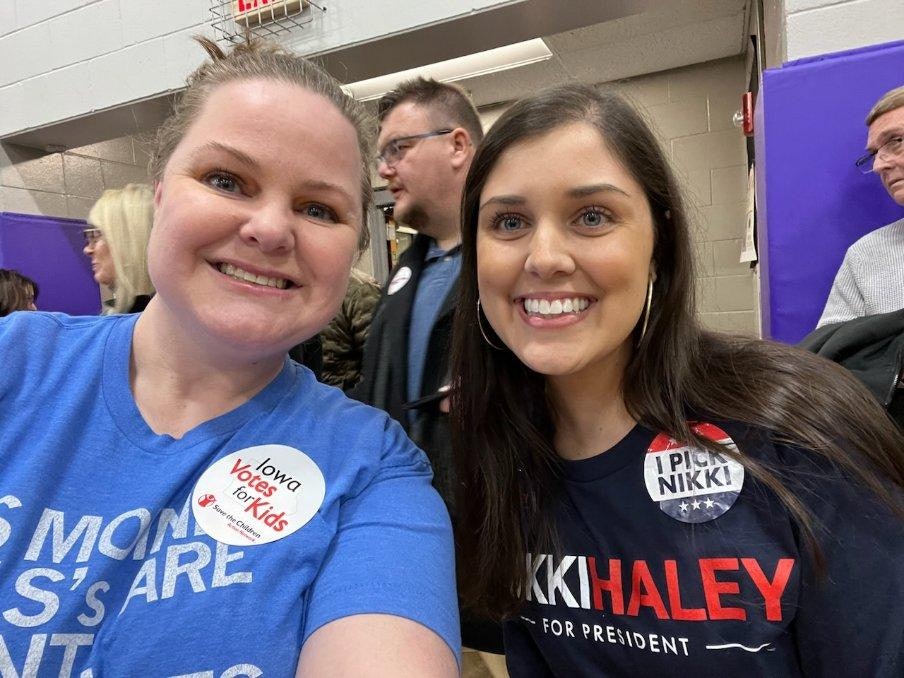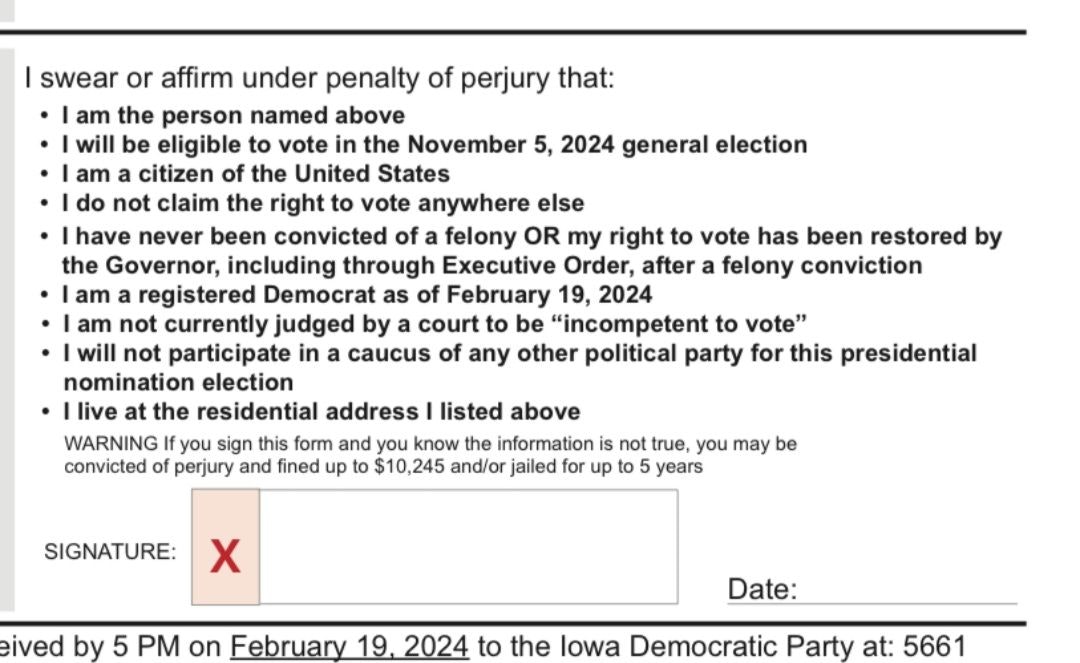
From left: Carolyn Jenison, Angelo Thorne, and Tanya Keith attend a Republican precinct caucus in Des Moines on January 15 after changing their party registrations. Photo by Tanya Keith published with permission.
The Iowa Democratic Party will soon send “presidential preference cards” to registered Democrats who would like to vote by mail for Joe Biden, Dean Phillips, Marianne Williamson, or “uncommitted.” Voters will have until February 19 to request the cards, and will need to return them by March 5 (or with a March 5 postmark).
One group of Iowa Democrats should not attempt to vote by mail, however: those who switched parties in order to attend a Republican precinct caucus on January 15.
WHAT WE KNOW ABOUT THE CROSSOVER VOTE
The entrance poll for this year’s Republican caucus indicated that about 2 percent of caucus-goers had previously been registered Democrats. We can’t know the exact number, given margins of error in any poll, but it’s reasonable to assume 2,000 or more Democrats changed their party affiliation in order to vote for a Republican presidential candidate. (Total turnout for the 2024 GOP caucuses was 110,298.)
Anecdotally, Nikki Haley gained the most from those party-switchers, though some Democrats backed other candidates—there was even a Ryan Binkley voter in one Coralville precinct.
Among Democrats who caucused for Haley, some would support her in the November election, like Chuck Offenburger. Others, like onetime “Bob Ray Republican” Richard Gilbert, were less enthusiastic but would “rather see Nikki Haley in the Oval Office than risk the return of the chaos that came with 45.”
Many Democrats who caucused for Haley would not vote for her against President Joe Biden, but were hoping to slow momentum for Donald Trump’s candidacy in Iowa. That would include the three Des Moines residents pictured above, and Clive resident Tiffany Welch, who changed her voter registration back to Democratic shortly after the caucuses.

Tiffany Welch poses for a selfie with Rena Haley (daughter of presidential candidate Nikki Haley) at a precinct caucus in Clive. Photo published with permission.
Tanya Keith, who caucused for Haley in Des Moines, told Bleeding Heartland she considered participating in the Democratic mail-in caucus. But she felt it was more important to do something that “might keep us from having another Trump presidency, which I think is a legitimate threat to democracy.”
The last Iowa Poll by Selzer & Co before this year’s caucuses indicated that 43 percent of those planning to caucus for Haley said they would vote for Biden in a rematch against Trump, while only 23 percent would vote for Trump in that scenario. Even if the vast majority of Democrats who switched parties went for Haley, it’s unlikely they accounted for more than 10 or 15 percent of her caucus night total (21,085).
IOWA GOP CONSTITUTION ALLOWS PARTY-SWITCHING
Some Iowa Republicans had expressed concern about Democrats making mischief at the GOP caucuses. State party chair Jeff Kaufmann said during a September 2023 appearance on “Iowa Press” that Republicans were “having a lot of conversations” about ways to stop “some disaffected Republicans and Democrats from flooding our caucuses and giving us results that aren’t indicative of a Republican caucus.”
The sticking point: the Iowa GOP constitution has called for allowing same-day registration at caucuses since 1992.
Floyd County GOP chair Charley Thomson, a Trump endorser who also serves in the Iowa House, told Bleeding Heartland on January 15 that he had wanted to do away with same-day registration at Floyd County caucuses to avoid “the crossover problem.” He abandoned that plan after learning the Republican Party of Iowa’s constitution protected the practice.
Asked whether he will try to change that provision of the party constitution going forward, Thomson said, “We’ll see.”
Party-switchers were well within their rights to attend a Republican caucus. But whether or not they have already returned to the Democratic fold, they should not take part in the Iowa Democratic Party’s mail-in process this year.
“IOWA LAW PROHIBITS PARTICIPATING IN MORE THAN ONE POLITICAL PARTY’S CAUCUSES”
For decades, Democrats and Republicans have scheduled the caucuses for 7:00 PM on the same date, to prevent voters gaming the system to caucus with both sides. But Iowa Democrats conducted party business only—not presidential selection—at their 2024 precinct caucuses.
Kaufmann reminded the “Iowa Press” panel in September that it would be “illegal” for Iowans to participate in both parties’ caucuses. He was alluding to Iowa Code Chapter 43.91 (1), which reads in part, “Any person voting at a precinct caucus must be a person who is or will by the date of the next general election become an eligible elector, who has not already participated in the caucus of any political party within the same year, and who is a resident of the precinct.”
It’s not entirely clear that code section prohibits an Iowa voter from caucusing with Republicans on January 15 and mailing a preference card to the Democratic Party in February or March. The statute refers to “voting at a precinct caucus,” not voting by mail weeks later.
But the Iowa Democratic Party interprets the law the same way as Republicans. From the page on the party’s website providing caucus information:
Only registered Iowa Democrats who are eligible to vote in the November 5, 2024 election may participate in our Caucuses. Iowans must be registered as a Democrat by February 19, 2024. Iowa law prohibits participating in more than one political party’s caucuses.
Violating code section 43.91(1)—assuming it applies to Democrats who mail a presidential preference card after caucusing with Republicans—would be a serious misdemeanor, election misconduct in the third-degree.
Shortly after the caucuses, I asked the Democratic Party about plans to keep voters from deliberately or accidentally running afoul of the law. Communications director Paige Godden shared an image of “the language that folks need to agree to when they submit their Presidential Preference Cards.” It states in part, “I will not participate in a caucus of any other political party for this presidential nomination election.”

What if someone had already requested a card in December or early January, then decided at the last minute to attend a GOP caucus? Can the Iowa Democratic Party obtain a list of Democrats who changed their registration on January 15?
Godden responded, “We can’t share specifics, but we have several safeguards in place to make sure that registered Iowa Democrats are participating only in our caucuses.”
WHO WOULD ENFORCE THE LAW?
The state government reorganization plan Republicans enacted in 2023 gave Iowa’s attorney general exclusive jurisdiction to prosecute crimes under Iowa Code Chapter 39A, which deals with election fraud and misconduct. (See Sections 2061 and 2062 on page 1,055 of the realignment bill, known as Senate File 514.) Previously, Iowa county attorneys also had authority to prosecute election-related crimes.
As mentioned above, language prohibiting participation in both parties’ caucus during the same year is part of Iowa Code Chapter 43, which concerns caucuses and primary elections. Communications staff for Attorney General Brenna Bird did not respond to Bleeding Heartland’s inquiry about whether anyone on staff will be tasked with researching possible violations and filing charges against Iowans who attend a GOP precinct caucus and later mail a preference card to the Iowa Democratic Party.
Trump has repeated lies about Democrats rigging elections at nearly every public appearance since he tried to stay in power after losing to Biden. Bird endorsed Trump last fall and seemed to agree with the former president on the need to “clean up our elections” at an event she moderated two days before the caucuses. (See this video, beginning around the 40-minute mark.)
The reality is that the most extensive election fraud case in recent Iowa history involved efforts to cast dozens of unlawful ballots for a Republican candidate in 2020. But Bird and other GOP officials have incentive to make an example of Democrats caught taking part in both parties’ caucuses, whether or not those people intended to break any law.
So however much they may want to weigh in on Biden or the other Democratic options, it’s important for Iowans who caucused with Republicans not to request or return the Democratic Party’s preference card this year.
